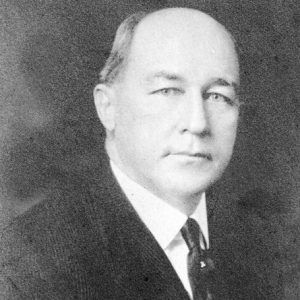calsfoundation@cals.org
Basil Baker (1871–1941)
Basil Thorpe Baker served on the Arkansas Supreme Court from 1934 until his death in 1941, and while his service was not long, his name appeared on 333 opinions, most of which reflected the sentiments of a unanimous court. On those occasions when he did dissent, his vote was usually cast for the common man as opposed to the large corporation. He was, his colleagues recalled, “neither a confirmed conservative nor liberal in his interpretations of Arkansas statutes.” Instead, as Horace Sloan observed, “he had a natural legal mind.”
Basil Baker was born on January 29, 1871, to Joshua D. and Bethia T. Jameson Baker on their Columbia County farm; he had one brother. His father was a farmer and also ran a store. Baker studied first in the country schools and then at J. H. Davis’s Select Male School in Magnolia (Columbia County) before attending Ouachita Baptist College (now Ouachita Baptist University) at Arkadelphia (Clark County), eventually graduating in 1895. He then moved to Craighead County, where he taught school while teaching himself law. As Judge Nathan F. Lamb of Jonesboro (Craighead County), who loaned him law books, recalled, Baker would come into town on Saturday with “copious notes” and “a list of questions which we discussed together.” Admitted to the bar in 1898, Baker served as Jonesboro’s city attorney in 1903–1904 and then, from 1918 to 1934, was the attorney for City Water and Light (CWL), a local improvement district. During that tumultuous period, CWL managed to withstand successive attempts by Arkansas Power and Light (AP&L) to acquire the facility. Baker also made an unsuccessful run for the state Senate, drawing opposition from the local Ku Klux Klan (KKK).
On October 14, 1897, Baker married Mary Elizabeth Kinsworthy, who also appears in historical records as Molly, Mollie, and May; the couple had two children. After his first wife died on July 9, 1917, Baker married Audly Matthewson States on Christmas Day, 1918.
Baker’s law partners were Thaddeus H. Caraway and John Frank Gautney. Baker announced as a candidate for the Arkansas Supreme Court against William F. Kirby when the latter came up for reelection in 1934. (This was retaliation against Kirby for running against Caraway’s widow, Hattie, for the U.S. Senate seat.) However, before a race even could develop, Kirby died of a heart attack on July 26, 1934. Interestingly, Baker had already served on the court. In Hixon v. School District of Marion (1933), a high court consisting entirely of special justices found unconstitutional the legislature’s attempt to fund old-age pensions by taxing all state and county warrants. After Kirby’s death, Baker, on September 15, 1934, was appointed to fill out the remainder of that term and then had no opponents in November.
Baker’s first opinion was in Fort Smith Gas Company v. Wiseman (1934), which reversed an earlier court ruling voiding a fee-supported Fact-Finding Tribunal in the Corporation Commission. Another of his constitutional cases was Cherry v. Leonard (1934), upholding legislation compromising the state’s highway debts to the bondholders even though it took using “the law of reason” to reveal the legislature’s intent.
Although Baker frequently lectured his fellow lawyers and judges, he was not above some judicial humor. Pope v. Oliver (1938) arose out of the extraordinary session called only to remove tolls on state bridges so that the state could receive $5 million in federal highway money. However, the toll-repealing law also contained an amendment repealing car inspection fees, and Baker wrote of the amendment that it “rode piggyback through both houses of the Legislature and, like the parasite it is, was clinging to the main bill when it received executive approval.” Baker was the author of the opinion in State ex rel Dudley v. Lyon (1935), yet another case heard to determine the legal acting governor when both the governor and lieutenant governor were out of state. The briefs, Baker wrote, provided “a great deal of information and entertainment.” The case turned on the meaning of “president of the Senate”: “The descriptive ‘pro tempore’ is surplusage, no more necessary than some other adjective that might indicate some particular characteristic, in relation to the office.”
One Baker hallmark was judicial restraint. In Smith v. State (1940), Carl Smith sought the writ of error coram nobis, for although convicted of burglary, the witness had recanted, and others had confessed to the crime: “It is somewhat gently hinted that we should, by judicial fiat, bridge this chasm of deficiency in the law of criminal procedure. The answer must be such rights are statutory, purely, and if there is a legal hiatus in such procedure, the remedy is legislative.” In Walls v. State Board of Education (1938), he wrote, “Generous impulses, however commendable, may not serve to palliate erroneous action,” while in Fries v. Phillips (1934), he noted that “in this court we cannot try the case de novo.”
Baker was stricken by heart disease in October 1940. He returned to the court in a wheelchair for a picture-taking ceremony in July 1941, but pneumonia set in, and he died on September 20, 1941, before he could formally retire. He is buried in Oaklawn Cemetery in Jonesboro. The Jonesboro Evening Sun called him an “outstanding leader” and “one of the leading attorneys of Arkansas,” adding that Baker had “won a place through all time to come in the Arkansas Hall of Fame.”
For additional information:
Dougan, Michael B. “Basil Baker’s Seven Years and Five Days.” Arkansas Lawyer 45 (Spring 2010): 24.
———. “Taking Judicial Cognizance of Soap: Justice Basil Baker’s Wit and Wisdom.” Arkansas Lawyer 45 (Summer 2010): 30.
“Justice Basil Baker of Arkansas Dies.” Arkansas Gazette, September 21, 1941, p. 1.
Michael B. Dougan
Jonesboro, Arkansas
 Basil Baker
Basil Baker 



Comments
No comments on this entry yet.